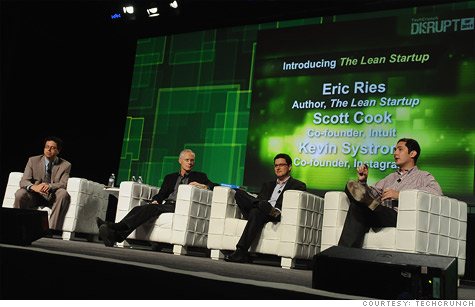
Instagram co-founder Kevin Systrom (far right) killed off his first venture, Burbn, to focus instead on the part of the app that users flocked to.
SAN FRANCISCO (CNNMoney) -- Go where the people are, and do it fast.
That's the message a panel of skilled entrepreneurs spread Tuesday afternoon at TechCrunch Disrupt, a San Francisco gathering for the tech industry's startup crowd.
Instagram co-founder Kevin Systrom said one of the key reasons his product was successful was his close attention to user feedback. Before Instagram became a hit photo-sharing app, Systrom was working on a check-in service called Burbn.
During a meeting, Systrom and his crew decided to shift gears.
"I remember what I'll call 'pivot day.' We sat down and said 'what are we going to work on next? How are we going to evolve this product into something millions of people will want to use?'" he said. "What is the one thing that makes this product unique and interesting?"
The answer was photos. Instagram, which launched 10 months ago and is still an iPhone-only app, now has more than 9 million users.
Systrom, Intuit founder Scott Cook, and Lean Startup author Eric Ries talked about the changes that have swept through product development in both big and small organizations. Many companies have moved from what's called "waterfall development" -- a method that relies on large engineering executing a carefully mapped-out plan -- to "lean" development, where creators move quickly to push out products and revise them on the fly.
"We thought about what we could do to iterate more quickly," Systrom said of Burbn's pivot. "People loved posting pictures on Burbn" -- so that's where they took the venture, jettisoning other planned features. Burbn now lives on only as an abandoned Twitter feed.
Cook said he applied the same method to Intuit (INTU), a company much larger and more mature than Instagram.
"We found we had big efforts that were delivering failed products," he said. "I got sick of the wasted engineering time."
Cook now gives his employees what Ries described as "an island of freedom to do experimentation," something few large companies are known for. Employees working on certain ideas report only when they have something to report, Cook said.
Ries suggested startups have regular "pivot" meetings. His other piece of advice: Don't rely on "vanity metrics." A large user count sounds great, but what really matters is how committed your users are to the product. ![]()